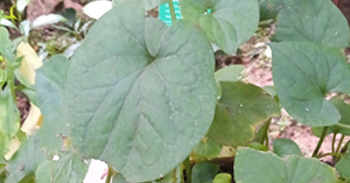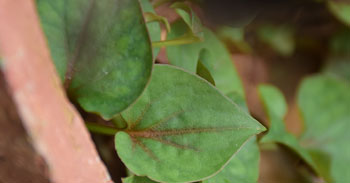KJC Medicinal Garden
Fish mint
Houttuynia cordata
Order: Caryophyllales
Family: Saururaceae
Genus: Houttuynia
Species: H. cordata
Common Names: Chinese herb, Wild water mint, Heartleaf, Chameleon plant, Heart-leaf, Dokudami (Japanese), Basella (in some regions)
Other plants of the same genus with medicinal properties
Plant type: Houttuynia cordata is a perennial herb that can grow up to 50 cm in height. It often forms dense, ground-covering mats.
Leaves: The leaves are heart-shaped (cordate) and bright green, typically 5-9 cm long. The margins of the leaves are smooth, and they have a distinctive fishy odor when crushed.
Stems: The plant has reddish, hollow stems that spread along the ground and root at nodes.
Flowers: Small, inconspicuous, and typically white to pale yellow, arranged in a spiked inflorescence. The plant’s flowers are surrounded by white petal-like bracts that are more noticeable than the flowers themselves.
Roots: The roots are fibrous and spread horizontally, forming a dense root system.
Uses in Tradition systems of medicine
Antibacterial and Antiviral: Houttuynia cordata has been used in traditional Chinese and Japanese medicine to treat infections and viral diseases such as colds, flu, and respiratory infections. It has been noted for its broad-spectrum antimicrobial properties.
Detoxification: The plant is often used in detoxifying remedies to cleanse the body of toxins, especially in herbal teas and traditional detox formulas.
Anti-inflammatory: It has been traditionally used to reduce inflammation, and its leaves and roots are applied to treat skin conditions such as eczema and acne.
Diuretic: The herb has diuretic properties and is used to promote urine flow and treat urinary tract infections (UTIs).
Digestive Aid: It is commonly used in Southeast Asia to treat gastrointestinal disorders, including diarrhea and dysentery.
Respiratory Health: Houttuynia cordata is used to alleviate symptoms of respiratory conditions like asthma, bronchitis, and pneumonia, often in the form of teas or poultices.
Rich in Vitamins and Minerals: Houttuynia cordata contains vitamins such as vitamin C, A, and several B vitamins, as well as essential minerals like calcium, iron, and magnesium.
Antioxidant: The plant has antioxidant properties, which can help neutralize free radicals in the body, potentially reducing the risk of chronic diseases.
Anti-inflammatory: The compounds in Houttuynia cordata help reduce inflammation in the body, which is beneficial for treating conditions such as arthritis and inflammatory skin disorders.
Antiviral and Antibacterial: Studies have shown that it has antiviral activity, particularly against the common cold and other viral infections, and it can also inhibit the growth of certain bacteria.
Detoxifying: It is commonly regarded as a natural detox agent that purifies the blood and promotes overall body health by enhancing the function of the liver and kidneys.
Active Phytochemicals
Flavonoids: The plant contains several flavonoids, including quercetin and kaempferol, which are known for their antioxidant and anti-inflammatory effects.
Essential Oils: Houttuynia cordata contains essential oils, including terpenoids like limonene and caryophyllene, which contribute to its antimicrobial and anti-inflammatory properties.
Alkaloids: Certain alkaloids present in the plant have been shown to possess antibacterial and analgesic (pain-relieving) effects.
Tannins: These compounds have astringent properties and are often used in traditional medicine for treating wounds and ulcers.
Polysaccharides: Houttuynia cordata also contains polysaccharides that have been linked to immune-boosting properties, as well as their role in fighting inflammation and infections.
References
Phytochemical and Pharmacological Properties: Various studies have explored the plant’s chemical constituents and therapeutic properties.
One such study is "Phytochemical Properties and Pharmacological Activities of Houttuynia cordata" published in the Journal of Ethnopharmacology (2015), which reviews its use in traditional medicine and its active compounds.
Anti-inflammatory and Antimicrobial Research: A study in Phytotherapy Research (2012) demonstrated the antimicrobial and anti-inflammatory effects of Houttuynia cordata extract, suggesting its use in treating respiratory infections and inflammatory diseases.

